What the Difference Between Fried and Boiled Eggs Is, and Which Ones Are Healthier
Eggs are one of the most popular food products. They can be used for cooking numerous dishes. Moreover, eggs contain easily digestible proteins, healthy fats, and vitamins.
5-Minute Crafts is telling you what the difference between boiled and fried eggs is, and which kind is healthier.
Eggs are traditionally eaten for breakfast in many countries, but it doesn’t mean you can’t have them for lunch or dinner. Eggs contain many nutrients that perfectly saturate the body.
Is it harmful to eat eggs?
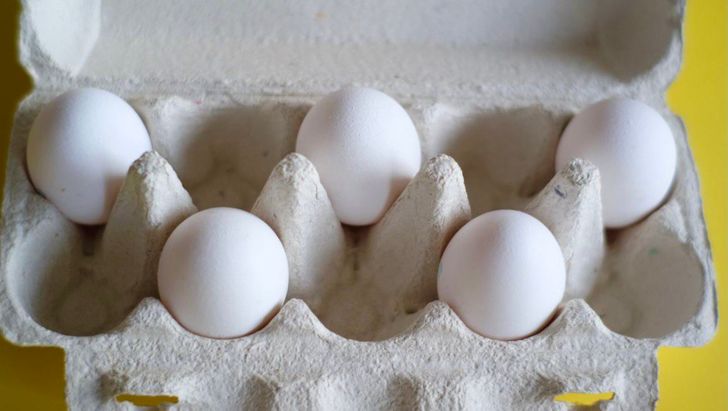
Dishes from eggs
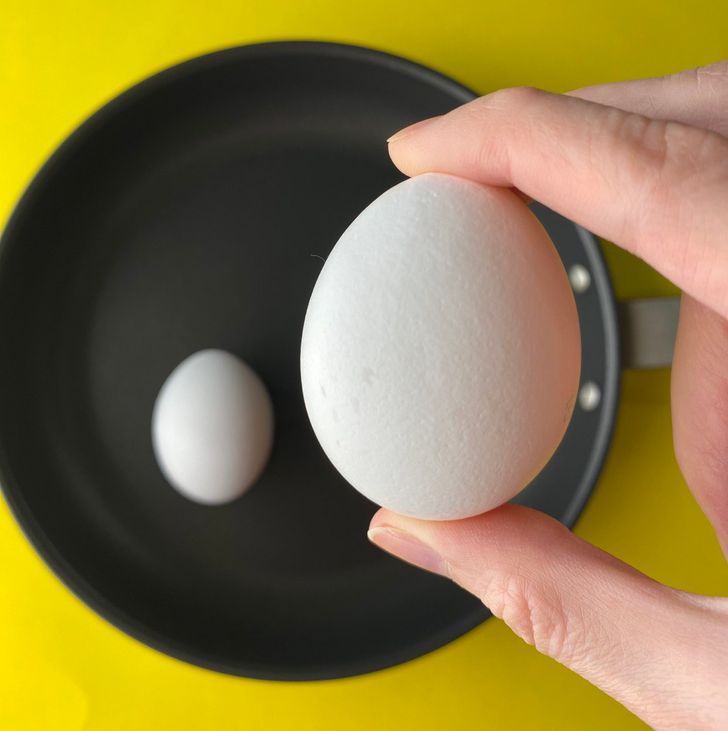
The most wide-spread dishes from eggs are:
- Omelets
- Fried eggs
- Poached eggs
- Hard-boiled eggs
- Soft-boiled eggs
- Egg casserole
- Bruschetta with eggs
- Meringue
How to cook eggs correctly

There are many dishes where eggs are one of the main ingredients. They can be boiled, baked, and fried, and the results are always tasty. Still, frying and boiling are 2 of the most popular ways to cook eggs.
Both options involve quite a lot of heating. When exposed to high temperatures, eggs, like many other foods, lose some of their beneficial properties. High temperatures reduce the number of proteins and healthy fatty acids in them.
At the same time, when cooked at low and medium temperatures, eggs retain their useful properties. In addition, the body absorbs 2 times more protein from properly cooked eggs than from raw eggs.
- Eggs need to be heated to a fairly high temperature during cooking to kill any bacteria that they might contain. Egg whites coagulate at 144°F to 149°F, and the yolk coagulates at 149°F to 158°F.
- It’s recommended to fry eggs on low heat. At the same time, the frying pan should heat up to 250°F to 325°F.
- When boiling eggs, bring the water to a boil, then reduce the heat. Soft-boiled eggs are boiled for about 6 minutes and hard-boiled eggs for 10-12 minutes.
Benefits of eggs
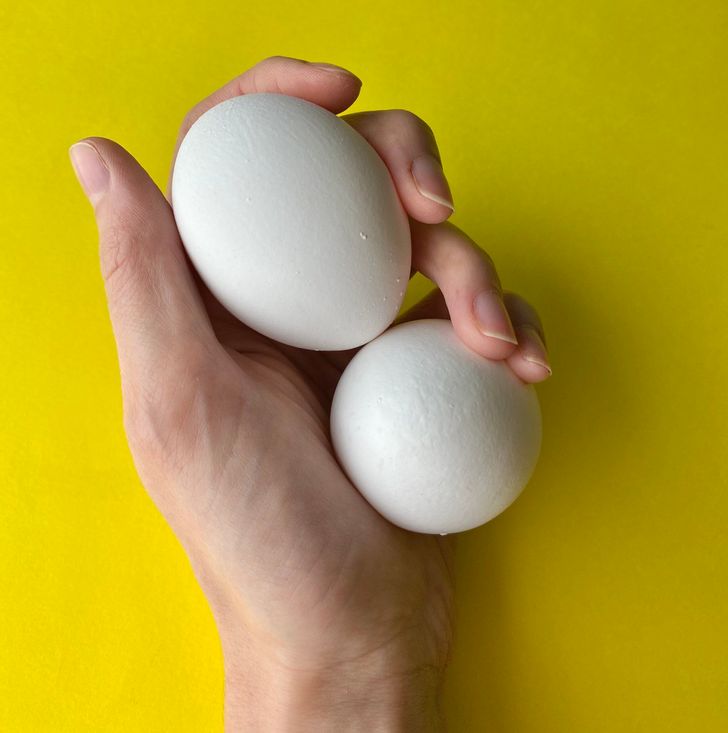
Many people wonder which eggs are healthier: boiled or fried ones. There is no definite answer to this question. A lot depends on how you cook the eggs and what you serve them with.
Eggs themselves are a very useful product. They contain omega-3 fatty acids, the highest quality protein, antioxidants, and 13 vitamins and minerals the body needs.
2 medium-sized eggs contain:
- 82% of the daily norm of vitamin D
- 50% of the daily norm of folate
- 25% of the daily norm of the B2 vitamin
- 40% of the daily norm of selenium
Eggs also contain vitamins A, E, B5, B12, iron, iodine, and phosphorus.
Are fried eggs really that harmful?

Fried eggs are believed to be an unhealthy dish because it’s fried. But this isn’t completely true. Of course, if eggs are cooked with a ton of fat, there will be far fewer benefits.
However, today, in the epoch of nonstick cookware, it’s easy to fry eggs with a minimal amount of oil. The calorie content of such scrambled eggs will be low. When frying, add very little oil and make sure it has a high burning temperature.
If you use vegetable oil, you’d better opt for a refined type. If you prefer butter, it’s better to choose ghee for frying.
When frying, the egg white starts to turn brown. This is due to the Maillard reaction that is a chemical reaction between amino acids and sugars that occurs when heated. It’s thanks to this reaction that the fried eggs get a nutty flavor. It is not dangerous to eat a golden crust. However, it is believed that over-fried eggs have fewer benefits.
The benefits of boiled eggs

There are 2 general types of boiled eggs: hard-boiled and soft-boiled. Hard-boiled eggs are boiled for a longer time and it reduces the number of healthy elements in them. That’s the reason why soft-boiled eggs are believed to be healthier. All vitamins are located in the egg yolk, which is why if it’s not exposed to too much heat, they stay preserved.
However, one shouldn’t over-boil eggs. When boiled, egg whites emit hydrogen sulfide. As the egg heats up, hydrogen sulfide penetrates deep into the yolk. The yolk contains iron, which forms iron sulfide when it meets with hydrogen sulfide. Perhaps you have noticed a greenish shell around an over-fried or over-boiled yolk. That’s iron sulfide. The longer eggs are boiled or fried, the more iron sulfide they have. There is no single opinion regarding its effect on the human body. Some think it’s toxic, while others don’t think so.
Nutritional value of eggs

Depending on the size, the egg contains approximately 55 to 80 kcal.
The yolk is much higher in calories than the white. In a 70-kcal raw egg, the white accounts for only 17 kcal, and the yolk for 55 kcal.
The energy value of 3.5 oz of raw egg white will only be 52 kcal. At the same time, 3.5 oz of raw egg yolk contains as much as 322 kcal.
We can see from the chart below that the white almost doesn’t have any fats or carbohydrates, while the yolk contains many fats. However, it’s worth noting that the biggest amount of fats in the yolk are unsaturated, which means they are healthy for the body.
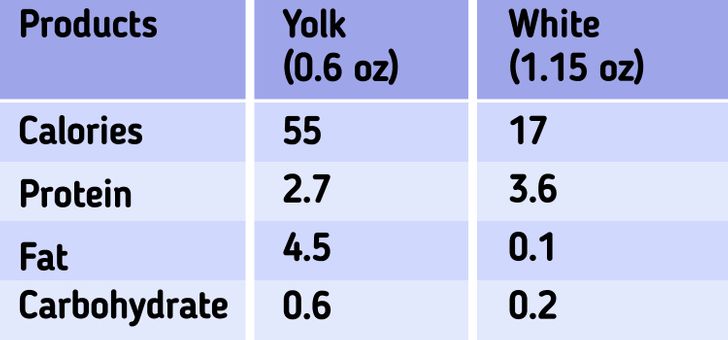
The calorie content of boiled and fried eggs
Many people wonder which eggs are more caloric: fried or boiled ones. The calorie content of fried and boiled eggs differs due to the cooking method. Eggs are normally fried on oil, which increases their calorie content. If you just sprinkle the pan with oil while frying the fried eggs, the energy value of the dish won’t increase much.
Therefore, if you take a raw chicken egg that has 72 kcal and boil it, the calorie content of the egg will rise to 78 kcal. But if you fry this egg, the calorie content will be higher at 90 kcal.
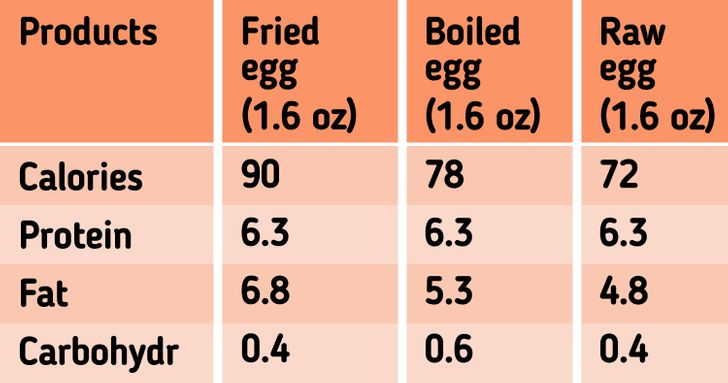
To boil or to fry
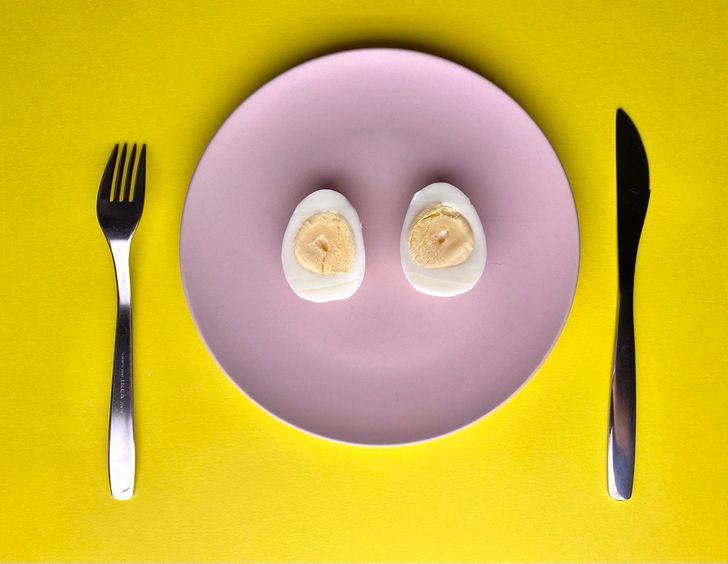
When deciding what to cook from eggs, each person should take into account their personal preferences. Some people like boiled eggs, others like fried eggs, and some prefer to cook more complex dishes from eggs. However, one should remember that using a big amount of oil and fatty products while cooking drastically increases the calorie content of eggs, just like the calorie content of any other product.
Also, one should make sure eggs are not over-boiled or over-fried. We have already mentioned above that it can be harmful to your health.
If it’s okay to eat raw eggs
It’s not recommended to eat raw eggs due to the risk of getting salmonellosis.
Salmonella is a bacteria that lives in the intestines of humans, animals, and birds. It causes salmonellosis, which most commonly comes to humans through food and water.
Eggs are one of the sources of this infection. Many people think that these bacteria live only on the shell but that’s wrong. Salmonella can get inside the egg before the shell forms, which is why eating raw eggs can be very dangerous. Salmonella dies at temperatures above 150°F.
Which eggs are the healthiest
Soft-boiled eggs are considered to be the healthiest. As it was mentioned above, we get the most benefits from the egg yolk. But when boiled, the yolk loses a part of its beneficial properties. Therefore, the less the yolk is boiled, the more benefits it preserves.
Frying eggs isn’t ideal either. When fried, yolks can reduce the number of antioxidants and nutrients. In addition, the calorie content of eggs increases due to adding oil.